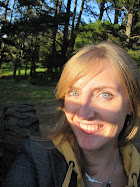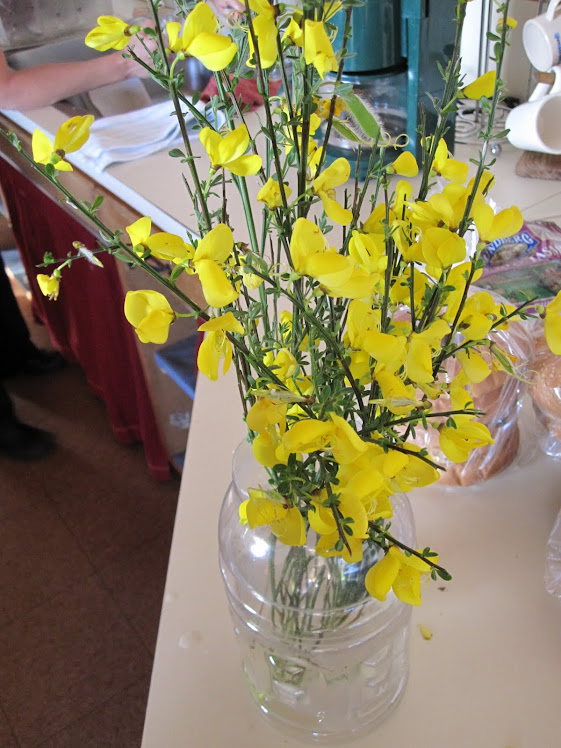“Why I Try to 'Say Yes Quickly'”Sermon for the First Unitarian Universalist Church of LA
23 May 2010
Samantha Wilson
Ingredients for actualizing our vision:Give up on prudent planning,
say “yes” quickly,
be the future.
Any one who knows me knows I have a tendency to say “yes” quickly. Perhaps, far too quickly.
I know this is a problem. At the age of 12, my step-father told me about “burning the candle at both ends.” That was a bit beyond me at the time. And, as a visual learner, I really pondered what that would look like and how on Earth you’d hold the candle. My undergraduate education was definitely the worst time for this kind of candle-lighting method—not only was I burning the candle at both ends, I was ostensibly trying to use the wax as a light mechanism as well. And now? God, who knows. I can’t even consider a metaphor for the amount of work I try to find myself doing on any given day. How much work all of us try to put in to one day. I am in my early twenties and tired. When anyone asks how I try to get it all done and where does all that energy come from, I smile and reply: “Coffee.”
But I don’t mean the business of our day to day lives when I talk about saying “yes” quickly. Because, in many of these day-to-day situations, saying “no” really means “saying yes” to your life— your sacred time, your wholeness, your well-being. And maintaining that sacred, careful balance between your commitment to self and your commitment to other.
For the purposes of today’s message, I mean “saying yes” as in openness, alternatives and impossibilities. I mean affirmation of radical vision. I mean the questioning of our obsession with rational thought and an embrace of intuition, insight, and interconnectedness. I mean opportunity. I mean, in the words of our poet, Rumi, today-- going mad.
ON PRUDENT PLANNING AND MADNESS I don't know about you, but I’ve tired prudent planning long enough. I have grown up and graduated in a time of tumult. When I was a freshman in high school President Bush invaded Iraq. I watched the twin towers go down in my AP History class. I watched as the principal came in and requested we turn off the TV and do our work. A month later, I attend a YRUU (Young Religious UU) conference in Santa Monica and we marched down the street, all of us wildly hormonal teenagers in various forms of UU teenager clothing and propaganda, calling out to cars on Santa Monica Blvd. for “no war on Iraq.”
When I graduated from college in June 2009, just last year, people my age were experiencing the worst unemployment in decades—52.2%--- a post World War II high. I watch friends walk across the stage at graduation ceremonies, grab their diplomas, and move back to their family’s home. Often, I watch them do so with backpacks full of debt.
Madness.
Maybe it means the whole lie is finally crumbling—the lie that there is not enough, that we have to fight for it with our degrees, qualifications and independence. Many of us were told that if we planned—if we did everything right—we could go to college and graduate with a good paying job, get married, have kids, rinse, repeat, rebirth. That lie sounds familiar right? I think many people are told that-- entering by birth or by boat into this country, that if they are prudent planners—if they pull themselves up by the bootstraps, they’ll be fine. They’ll make it. Everyone can be American and a money-making success.
Madness.
You know where I hear this whole “prudent planning” thing a lot? I hear it in relationship to non-profit or social work. Which to me, is particularly out of this world.
As a 20-year-old woman, I had an idea that children and youth are not the leaders of tomorrow but the leaders of today, and thus are deserving of all the resources and love and opportunity we could provide them as a model of what we should provide each other our entire lives. Furthermore, I had the idea that this should be a wide, borderless effort. I wrote a proposal, went to India, and started a values-based leadership and social justice program for children and youth that has since taken the legal shape of a non-profit called the Child Leader Project operating in India, Mexico and the USA. This is also my second, full-time job (after the one that does pay in US currency) and is the reason for all of the coffee drinking.
And while Child Leader Project or CLP has brought me more joy than you can imagine, a concrete space to actualize my UU belief system, it has also placed me in a buzzing world of people with a very specific notion of what “success” looks like. And it isn’t far at all from the for-profit, business world.
For example, I can’t tell you how many times I’m told to say “no” to partnerships—and to focus on writing a business plan, developing a budget, creating a board of wealthy, well-connected people and prudently plan the next five years so I may professionalize this community organization and “make a living off of” my social justice work. And that would be “success.”
To me? This is madness. Why? I live because of my social justice work. So, no offense to prudent planning. I know the role of strategy. But my strategy—when it comes to graduating in a depression or seeking meaningful work or striving for social change—does not make home with rationality and prudent planning. It makes home with vision and possibility.
And I know, from my experience and the stories told to me about this church, that you are in a similar position—you’re careful investing and vision in the property and neighborhood that surrounds you is about to take shape and reveal the deep purpose to why you are physically located in the place where we sit today: an incredible minister, financial capital, and a vision. The ingredients of great possibility is here! We ALL feel it. But how to actualize that?
ON SAYING ‘YES’ QUICKLYMy approach? Give up on prudent planning and say “yes” quickly.
In our poem today by Jalal ad-din Rumi:
“Conventional knowledge is death to our souls—and it is not really ours. It is laid on. Yet we keep saying that we find “rest” in these “beliefs.” We must become ignorant of what we have been taught, and instead, be bewildered.”Conventional knowledge, rational knowledge (as defined by acting in objective and logical accord with one's own goals), requires our attention and careful critique. Mysticism, for me, has been a great place to start.
A little background: Rumi was a Sufi mystic. Sufism, in the most general definition, is the mystic form of Islam. It recognizes unity with the divine, other-worldliness—a refocusing towards the inner worlds as a connection to the complexity and the Divine vastness of God. God, in this way, is undefinable, incomprehensible and refuses all labels and limitations. (Rumi, also, FYI, is the fastest selling poet in the USA-- how “successful!”)
Mysticism, from my interpretations and experiences, is a direct challenge to rational, binary thought. And, in fellowship with the message of mysticism, I find traditionally-defined rational thought very restrictive. Why? Its so limiting! In limiting myself to rationality, I consider only those options which have been created through the limited lenses of my own rational thoughts and assumptions. I consider only that which I have interacted with, which I can neurologically refer to, only what I’ve seen, only what has already been done or something similar, and only what I’ve been told to do. As Rumi said, only that which has been “ laid on.”
In Sufi-inspired words: my rational thought does not leave room for the infinite, Divine creative and complex vastness of this world and infinite possibilities of our lived experiences. Rational thought is not visionary thought. Rational thought is not radical thought.
If rational thought is not visionary, not open to divine vastness and not radical — why on earth should it serve as the primary basis for our decision-making, planning, and action when it comes to creating a new world in our hearts, homes and local and global communities?
Lets give rational thought a well-needed vacation and put it in its place—a place in balance with other forms of knowing and experiencing. I think this is a key step in actualizing futures of possibility. To be visionary requires that we imagine, and “say yes quicky to” the unfathomable and embrace the Divine vastness that surrounds us.
Imagine being in a board meeting about the budget and saying, “the money will come.” Not exactly prudent planning. I have been known to say this many times at non-profit board meetings as well as to donors, which seems like a very ineffective fund-raising strategy. Perhaps it is horribly ineffective. But I think my real intention with that statement is that if our collective focus and energies are focused entirely on the worrying about money, we will neglect the real work that creates the real wealth within each of us and the invitation to others to join in the work.
The work is our real wealth. For this, I resonate with Lynne Twist. In her book, “The Soul of Money” she reminds us of the three great lies of capitalism:
(1)there is not enough
(2)more is better
(3)that's just the way it is.
Madness. There is enough. Lynne Twist even refers to Rumi (I told you-- this guy gets a lot of press) and his poetry on “sufficiency”:
“I lived on the shady side of the roadand watched my neighbours' gardens across the wayreveling in the sunshine.I felt I was poor, and from door to door went with my hunger.The more they gave me from their careless abundance the more I became aware of my beggar's bowl.Till one morning I awoke from my sleep at the sudden opening of my door,and you came and asked for alms.In despair I broke the lid of my chest open and wasstartled into finding my own wealth.Why do I say 'the money will come?' Because the real wealth is already here.
BE THE FUTUREIn “Community: Structure of Belonging,” author Peter Block explores community-building as a process of invitation, gift-giving and deep listening. Imagine this: a meeting with the primary purpose to invite-- not demand-- one anothers full participation without penalty and seek out the gifts each person brings to the table. While that may sound airy and open-ended, it is far from a day-dream: it is a challenge. A citizen, in Block’s opinion, is one who “produces the future, someone who does not wait, beg or dream for the future.”
For me, I prefer BE the future.
Nice-- but what does that look like? Taste like? Smell like? Feel like? In our day-to-day lives, the lives where we really are caught between saying “yes” and “no” to honor our commitments to self and other, how do we not only create or strategically plan, but embody a new future? How do we forgo “prudent planning” when everyone else has strategies pouring from their pockets?
This passed April, I attended a conference at Yale University called “Global Health and Innovation Conference.” It brought together thousands of academics, executives, directors, business people and health and social work professionals to one university to listen to lectures on social entrepreneurship. In this case, social entrepreneurs are defined as those with small ideas that can be duplicated on a large scale to make societal changes. The incredible individual who popularized microfinance in Bangladesh, Muhammad Yunus, was a social entrepreneur-- but, then again, so was Sam Walton, founder of WAL*MART. So, we gotta watch out for these people.
As a representative of the Child Leader Project, I was given the opportunity to spend five minutes “pitching” my organization as a scaleable, sustainable organization for “international development” at this conference. I was given the chance to define myself as a social entrepreneur.
This was difficult.
First of all—five minutes!? How can we say anything of worth in five minutes!? As you can hear, I've got a lot to say.
Second of all—CLP was not something I could pitch. It was something that was felt. It was a philosophy. And it was alive. Hugging the entire room would communicate more about CLP than a power-point.
Third, they wanted my packaged idea ASAP. The conference requested my power-point presentation one month in advance and it killed me—how would I know what really needed to be said at the conference? How would I know what story is missing until I was there, amidst the people, amidst the conversations and lectures? What if the spirit moved me in a different way? For heaven's sake, how could I be open to divine vastness when my freakin' power point was due a month in advance!?
My response to the power-point conundrum? Prepare a power point consisting entirely of open-ended questions and photos of children and the Earth.
This was risky. You see, this was my "opportunity" to "prove" I had a model worth duplicating-- there were very “important” people in these rooms watching for new ideas. You didn't want to mess around. Furthermore, the conference was expensive. We have to make the most of it. Get your business cards ready and prepare your pamphlets, bust out your graphs proving how you are the best in your field!
But, remember, I'm cultivating a practice of madness. So I looked within my own inner wealth like we talked about today, and spoke from that place. In my five minutes, I invited three "future" ideas into the room:
(1) That, specifically as an international conference, we must actively and openly acknowledge that historic and present-day structures of persistent inequality—racism, sexism, classism and it’s close bedfellows, imperialism and colonialism—would require all of us to walk with radical humility and partnership as we embark on this path. In other words, shatter your innocence, acknowledge your privilege, and recognize the need for all of us to be transformed-- not for “some other” to be transformed...
(2) ….and, closely related to that, we should never--ever-- use the words “underdeveloped,” “developing,” and “developed” again. Because the labels we give guide the way we think, and the way we think guides the way we act. And I have no idea how an entire nation of people made of imaginary, human-constructed borders, could be underdeveloped or developed unless someone has a superiority complex about the country they are in and wants the rest of the world to be defined on the basis of their believed superiority. And...
(3) ….that our focus at these conferences should be for us to embody the world we wish to create, not talk about it or bemoan it. This should be THE space of collaboration and co-creation of a new world where all people are present in the room to participate-- not our opportunity to prove how well-packaged and fundable our idea is. In the words of Peter Block, that we should be citizens.
I said very little-- if anything-- about CLP.
As you can probably imagine, this presentation was quite different than any of the other “social entrepreneurship pitches” that I saw that weekend at Yale. And I was scared. In fact, I felt mad. However, you can imagine my joy when I heard the small beginnings turn into the loud roar of applause-—in the middle and in the end. Unlike any of the other entrepreneurship pitches that I had seen that weekend.
You know what that says to me?
It says that we don't need a pretty package, we need a new vision. The world needs us to question the very rationale, very foundation, of our decision-making. The world is begging us to BE the future right now, not wait for it. All the way to the social entrepreneurship conferences of Yale University we are aching for deeper meaning than “success” as defined by accumulation, wealth, profit, and comfort.
An individual asked if she could partner with me on a project—she asked quickly, “Do the kids need to be a certain age?" NO. "Do they need to be disabled?" NO. "Do they need to be poor?" NO. "Do they need to be orphans?" NO.
“So you say ‘yes’ to anyone?” she asked, curiously.
I smiled. “Did you resonate—in your heart—with everything I just said up there? Did that speak to you?”
“Yes.”
“Well, we’re partners already.”This is the divine vastness of God. Rumi wrote another poem entitled, “Say YES Quickly”— it begins
“Forget your life. Say God is Great. Get up.” and continues…
“If you are here unfaithfully with us, you’re causing terrible damage, if you’ve opened you loving to God’s love, you’re helping people you don’t know and have never seen.”We were already partners. We are all already partners. Maybe our rationality didn't let us see it, maybe we thought we were competing for scarce resources or fundable ideas.
No. We just, albeit briefly, like human beings do, forgot our places as brothers and sisters, as one, in the Divine vastness of our world. I know I will not be limited, I will be expansive. I will be without borders. I have tried prudent planning long enough. I will run from what is profitable and comfortable. Forget safety. I will live where I fear to live. I will destroy my reputation. I will be mad.
A CALL FOR THIS FAITH COMMUNITY
And I invite this church to do the same. You are not making the church of tomorrow, because tomorrow is already here. You are the future. Look! This is a group of human beings BEING the future it envisions: A world with open doors. Borderless. One where communities gather in gardens and we see land, not for ownership, but as an opportunity to cultivate healthy food as well as healthy human beings with affordable, sustainable housing. A bilingual...trilingual..world. A world aware of its surroundings, aware of its history, aware of the possibilities in its future. A world that invites all the people to live out their uniqueness without any demand to assimilate into one faith or one entity.
Why? Because you realize the most important thing a mystic can remind you-- you already are one and another, you are the Divine vastness. You already are partners.
I'll close with Rumi:
“For years, copying other people, I tried to know myself.From within, I couldn't decide what to do.Unable to see, I heard my name being called.Then I walked outside.The breeze at dawn has secrets to tell you.Don't go back to sleep.You must ask for what you really want.Don't go back to sleep.People are going back and forth across the doorsillwhere the two worlds touch.The door is round and open.Don't go back to sleep.”Let us stay awake together. Thank you, blessed be.





